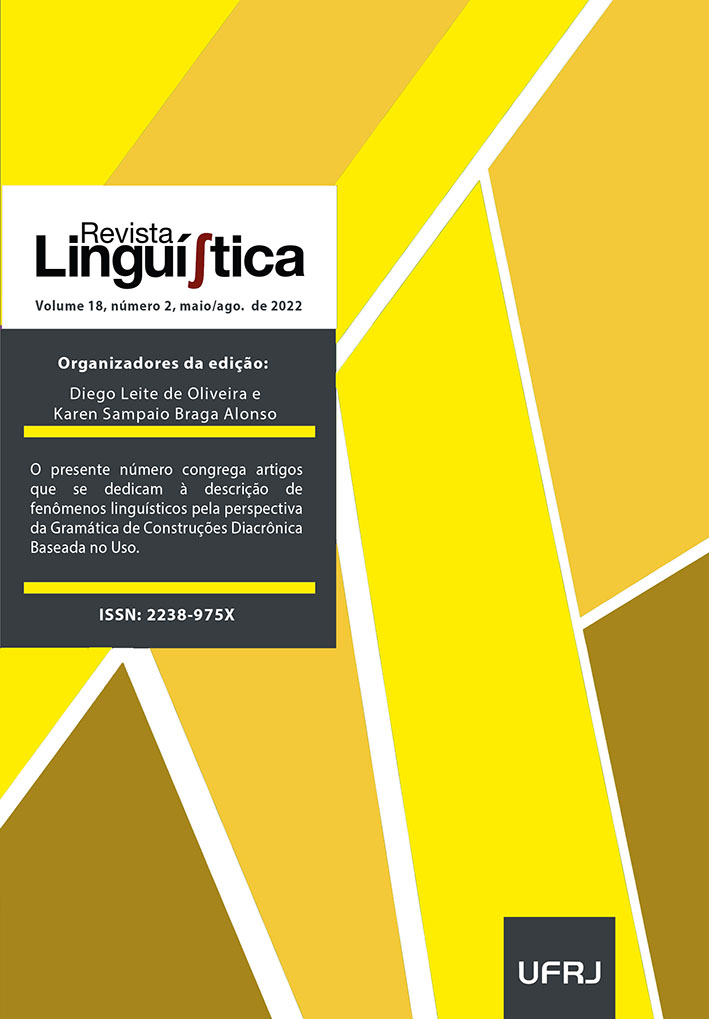Interview with Elizabeth Closs Traugott and Graeme Trousdale
DOI:
https://doi.org/10.31513/linguistica.2022.v18n2a59884Palavras-chave:
interviewResumo
Desde a última década, muitos livros e artigos têm sido publicados no campo da mudança linguística, em uma abordagem funcional-cognitiva. Entre essas contribuições, o livro Constructionalization and Constructional Change (TRAUGOTT; TROUSDALE, 2013) tornou-se um livro de leitura obrigatória para quem trabalha ou deseja trabalhar com construções em uma perspectiva diacrônica. Os autores, Elizabeth Traugott and Graeme Trousdale, trouxeram a público um texto provocador sobre como novas construções são cunhadas na língua ao longo dos séculos. Para isso, estabeleceram uma diferença entre construcionalização e mudanças construcionais, considerando a primeira como a criação de uma nova construção e a última como mudanças na forma ou no sentido de uma construção pré-existente.
No Brasil, como em diversas partes do mundo, o livro se tornou popular e passou a figurar no centro de um rico debate sobre a conciliação entre Gramática de Construções, um modelo teórico sobre o conhecimento linguístico do falante, e a mudança linguística, que vai além do tempo de vida de um indivíduo. Para aqueles que adotam os conceitos do livro e os que criticam algumas das definições e entendimentos apresentados pelos autores, há ainda muitas questões em aberto acerca da abordagem diacrônica da gramática.
Na sequência desse debate, estamos muito felizes por temos entrevistado Elizabeth Traugott (Professora Emérita da Universidade Stanford) e Graeme Trousdale (Professor da Universidade de Edimburgo) para celebrar os dez anos da publicação de Constructionalization and Language Change. Nesta entrevista, você poderá ver o modo como os autores veem seu trabalho de 2013, como eles dialogam com as críticas recebidas e como eles entendem a mudança linguística em 2023.
Downloads
Downloads
Publicado
Edição
Seção
Licença
Autores que publicam na Revista Linguí∫tica concordam com os seguintes termos:
Os autores mantêm os direitos e cedem à revista o direito à primeira publicação, simultaneamente submetido a uma licença Creative Commons que permite o compartilhamento por terceiros com a devida menção ao autor e à primeira publicação pela Revista Linguí∫tica.
Os autores podem entrar em acordos contratuais adicionais e separados para a distribuição não exclusiva da versão publicada da obra (por exemplo, postá-la em um repositório institucional ou publicá-la em um livro), com o reconhecimento de sua publicação inicial na Revista Linguí∫tica.

A Revista Linguí∫tica é uma revista do Programa de Pós-Graduação em Linguística da UFRJ e se utiliza da Licença Creative Commons - Atribuição-NãoComercial 4.0 Internacional (CC-BY-NC)









